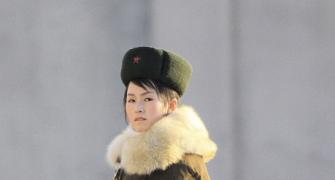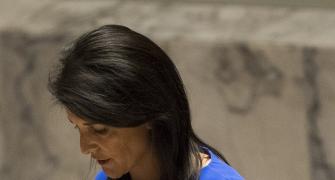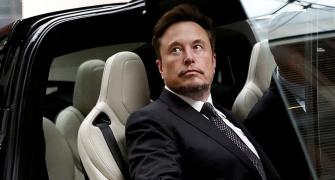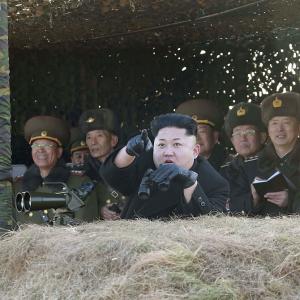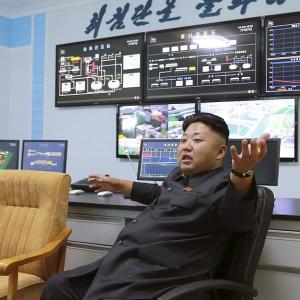After Pyongyang tests a missile potentially capable of reaching the US, Dr Rajaram Panda explores the realistic -- and peaceful -- options before Donald Trump and the international community at large.
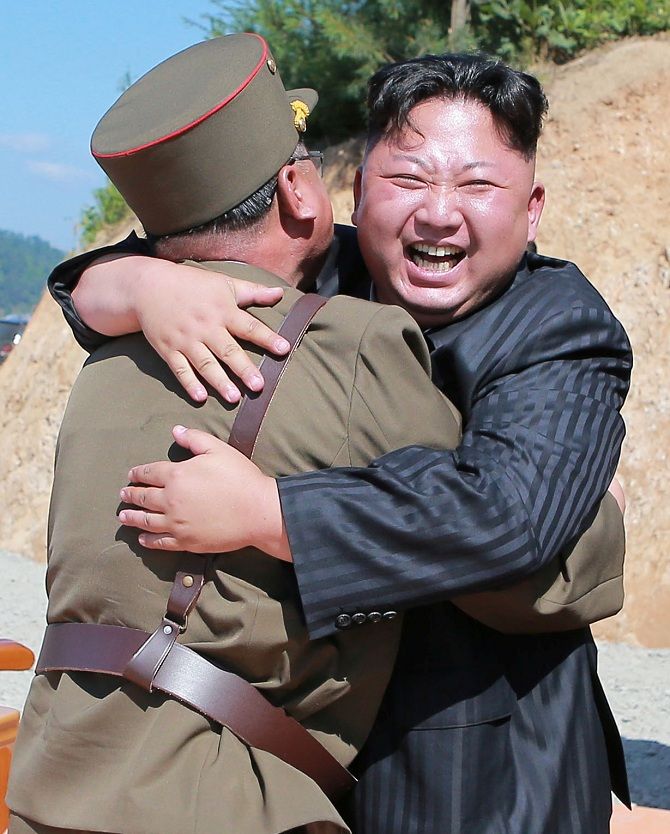
United States President Donald J Trump faced the severest foreign policy challenge of his short White House stay on July 4, when North Korea launched the Hwasong-14, an Intercontinental Ballistic Missile (ICBM) potentially capable of striking Alaska, if not parts of the US West Coast, from the North Pyongan province.
Though it was initially disputed that this was actually a new ballistic missile of medium range, flight data subsequently confirmed that it was indeed an ICBM -- tested at a lofted, or steep, trajectory -- posing a real threat to the US.
North Korea's nuclear and missile programmes have been a thorn in the side of previous US administrations, but Trump faces greater heat as Pyongyang's capacity to strike the US now looks real.
This has left the Trump administration with few palatable options.
Various statements made by Trump, his defence secretary and other senior officials say that the US is weighing options starting from harder diplomatic and regulatory tools that could strangulate the North Korean economy, pressuring China, and imposing further harsher sanctions to a pre-emptive military strike.
Trump has declared that all options are on the table.
This essay examines some of the options available to deal with North Korea and if they will yield the desirable result -- denuclearising North Korea.
Option 1
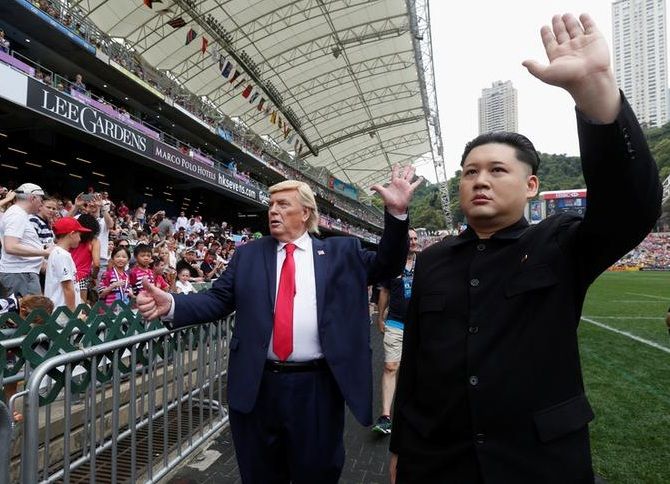
Trump should set an example of restraint or else there will be no difference between the US president and the North Korean dictator.
Photograph: Bobby Yip/Reuters
Trump, impetuous as always, has talked tough and made threats without realising the consequences of executing said threats.
As a first step, it would be sensible for him to scales down his bellicosity and speak in more sober diplomatic tone so that tensions are not needlessly escalated.
The threat of a military strike should not figure in his vocabulary.
As the top leader of his country, it is expected of him to set an example, so that his senior officials also do not use any offensive language or else there will be no difference between the US president and North Korean dictator Kim Jong-un.
Such rhetoric and bellicose remarks are made by street-level gangsters and not political leaders heading nations.
Option 2
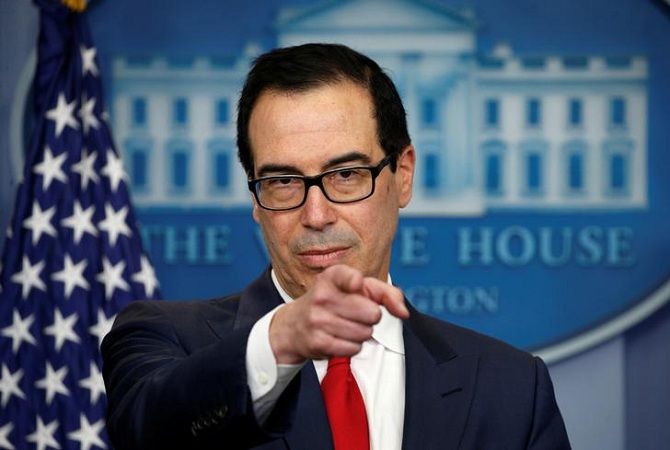
North Korea already faces stringent UN sanctions. Additional sanctions are being sought by the US, Japan and South Korea.
Photograph: Kevin Lamarque/Reuters
Further tightening economic sanctions that are already in place can be done through restrictions on the flow of oil and other energy supplies to Pyongyang's military and weapons programmess, tightening control over air and maritime traffic to North Korea, intercepting cargo ships and punishing Chinese banks doing business with Pyongyang, and holding senior officials of the Kim Jong-un regime accountable for the country's defiance of international demands to shut down its nuclear weapons development programme.
North Korea is already facing stringent United Nations Security Council sanctions.
Additional sanctions are being sought by the US, Japan and South Korea to send North Korea a message that there will be consequences if its destabilising actions are not stopped.
Trump, his South Korean counterpart President Moon Jae-in, and Japanese Prime Minister Abe Shinzo met on the side-lines of the G-20 Summit in Hamburg, Germany, to press for an early adoption of a new UN Security Council resolution with additional sanctions and more stringent measures against North Korea for its provocative and escalatory actions.
It was the first trilateral since March 2016, the first since Trump and Moon took office, and it was Abe's first face-to-face meeting with Moon.
The Trump administration is also reaching out to countries all over the globe to urge them to expel any North Korean guest workers, and drastically cut any investment or trade with Pyongyang.
Many African countries employ North Korean guest workers and buy spare parts for Soviet-era military equipment as well as sophisticated new missiles them.
Trump has sought Egypt's cooperation and urged it to stop hosting North Korean guest workers and stop providing economic or military benefits to the country. He asked President Abdel Fattah Sisi to respect the sanctions.
Egypt was brought to Trump's attention because it was a customer for North Korean missiles, and an Egyptian company, Orascom, had installed the North Korean cellphone network.
Interestingly, however, Egypt was responsible for the 2016 seizure of a cargo ship in the Suez Canal with 30,000 North Korean-made rocket-propelled grenades.
There are countries that allow and even encourage trade with North Korea in violation of Security Council resolutions, and also maintain trade ties with the US.
Moldova recently announced its intentions of exporting wine for the more sophisticated palates of Pyongyang.
President Igor Dodon of Moldova has a clear plan to expand trade with North Korea; for him North Korea is not a problem.
Though the US wants to play the trade card against North Korea, it is not clear if such a strategy will be successful.
It might succeed in prevailing upon small African nations not to continue doing business with North Korea, but it is unlikely to succeed in persuading China to pull back.
Therefore, the US efforts to strangulate the Korean economy are unlikely to make much headway.
China continues to be North Korea's economic lifeline.
Though in a cosmetic sign of support to the US, it stopped importing coal from North Korea till the end of 2017, trade between the two countries grew almost 40 per cent in the first quarter of 2017.
While China buys garments and minerals such as iron ore from North Korea, North Korea relies on its larger Communist neighbour for just about everything else, including most of its food and energy supplies.
Chinese banks also handle North Korean trade deals.
China is North Korea's only ally. And China has its own compelling reasons to keep North Korea afloat.
Tightening economic screws on North Korea could precipitate a regime collapse resulting in millions of refugees crossing the border into China.
China will do its best to prevent such a possibility.
All of these make it difficult for Trump to get China's wholehearted support.
And without China's cooperation, the trade card is unlikely to succeed.
The US took a small measure in June 2017 by sanctioning a small Chinese bank that it said had facilitated North Korea's purchase of ballistic missile technology.
The Bank of Dandong, located in a border city on the Yalu river, had done 17 per cent of its business with North Korean-related customers.
Is this a warning that the US could go after larger banks, even the Bank of China, if they are found to have dealings with North Korea and that Beijing should take notice?
China is unlikely to change its policy choice.
Scott Snyder, an expert at the Council on Foreign Relations, likens the China-North Korea border to the US-Mexico border: 'There is a lot that comes through regardless of how effectively sanctions are enforced. It is like trying to stop drugs.'
UN sanctions have not been effective because the North Koreans are aided by too many non-North Koreans -- the Chinese, Russians, Malaysians, Europeans.
Despite its international ostracism, North Korea has succeeding in clinching trade deals throughout the world.
Angola, Algeria and Mauritania have all hosted North Korean trade delegations in recent months.
It also reportedly sold a $6 million air defense system to Mozambique and missiles and rockets to Sudan.
Guest workers from North Korea in several countries send most of their salary directly to the government and often live in slave-like conditions.
Such workers are found in Polish shipyards and in forestry sites in Russia. Many did construction work on World Cup stadiums in Qatar.
According to a 2015 UN report, an estimated 50,000 North Korean workers abroad and sent as much as $2.3 billion to the country.
If this is the case, it is doubtful if this 'economic strangulation' option will work.
Even if one agrees that North Korea poses not only a threat to the US, its allies and all nations in the region and beyond, unless there is a resolute action by the international community, Trump's strategy to economically punish North Korea is likely to flounder.
Option 3
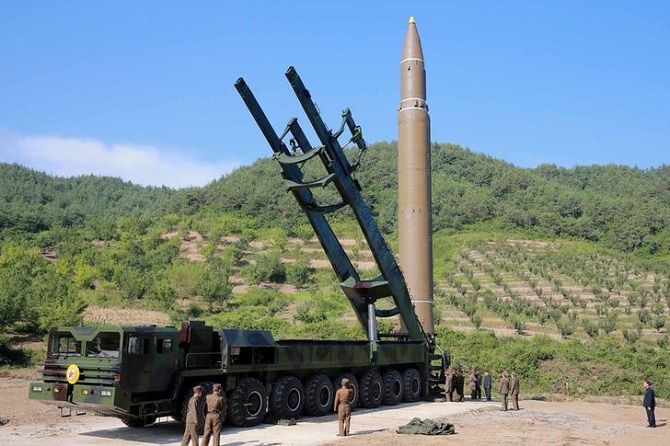
Can the US pull off what it did to Iran's nuclear programme with North Korea as well?
Photograph: Korean Central News Agency
The third option could be resorting to covert action, similar to what the US used on Iran in cooperation with Israel, setting back Iran's nuclear programme via a computer virus called Stuxnet that destroyed thousands of centrifuges used to enrich uranium.
The US did try this in 2009 and 2010, but without success.
Given the extreme secrecy and information control maintained in North Korea, it is difficult for the US to penetrate the country's information network.
Option 4
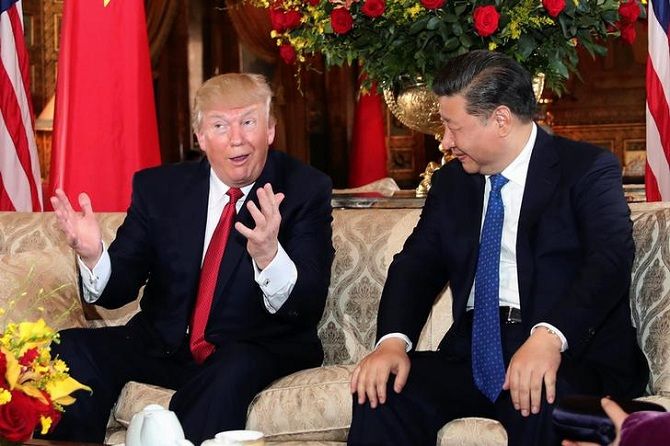
The question that remains unanswered is: How relevant is China to reining in Pyongyang?
Photograph: Carlos Barria/Reuters
The fourth option -- and the preferable one -- is to continue pursuing diplomatic negotiations.
The Trump administration is open to diplomatic negotiations with North Korea, but only under the right conditions, and aimed at denuclearisation, a condition unacceptable to Pyongyang.
For the Kim regime, possession of nuclear deterrence is the only means of the country's survival.
It is unwilling to barter this for any attractive carrot.
The suggestions made by China and Russia for the US to discontinue the annual joint military drills with South Korea in exchange for suspension of further missile launches and nuclear tests is unacceptable to the US.
This makes the diplomatic option a non-starter.
The US, Japan and South Korea might have seen merit in continuing to persuade China and Russia to put pressure on North Korea and draw her to the negotiating table, but the ICBM launch -- as observed by Abe -- shows that Pyongyang has 'no intention of having serious dialogue'.
The problem here is Moon prefers an engagement strategy, and has rejected the hardline approach of his conservative predecessors.
He had apparently remarked that North Korea's denuclearisation could not be achieved immediately, and it would be necessary to start a dialogue after freezing its nuclear development and then achieve denuclearisation in stages.
So, Abe and Moon might not find themselves on the same page.
When Abe observed at the trilateral summit in Hamburg that 'to deal with North Korea, it is absolutely meaningless to hold dialogue for the sake of dialogue,' he was apparently cautioning Moon.
Assuming that Trump prevails upon the two Asian allies for a common stand on North Korea, how does he deal with Xi to get China's support to have real progress?
Both have several things in common.
While Xi's father Xi Zhaogxun was a well-known revolutionary, Trump inherited a fortune and a real-estate business from his father Fred.
Both perceive the world as a zero-sum-game and favour coercion over consensus.
Both abhor loyal opposition and demand unquestioned loyalty.
With such shared natural advantages, can their negotiation strategies have any future?
Before the Florida summit in April, Trump had raised the trade issue and mentioned raising the tariff on Chinese imports, which raised the prospect of an impending trade war.
During the summit, he not only made no mention of a tariff hike or trade war, but proclaimed 'great chemistry -- not good, but great,' and hailed Xi as a 'very good man' with an 'incredibly talented wife.'
Xi did not reciprocate Trump's outpouring of emotion.
Trump probably did not realise that Xi may look flexible from the outside, but is very rigid inside.
By becoming genial, Trump had hoped to persuade Xi to choke off trade to North Korea, as a way to curb its nuclear programme.
Sadly, that was not to be, and Trump's immaturity in estimating the Chinese mind was exposed.
On the other hand, Xi was pleased that he was able to mollify Trump, a far cry from Trump's campaign charge of China 'raping' the US.
When Trump realised that the one-way romance was fragile, and that Xi was not going to pressure Pyongyang into submission, he announced sanctions against Chinese entities accused of aiding North Korea's weapons programmes.
Irritating China further, the Trump administration also announced a $1.4 billion arms sale to Taiwan, moved ships into the contested waters in the South China Sea, and renewed threats of tariffs and a trade war.
Despite this, when Pyongyang shocked the world on July 4 by launching an ICBM -- thereby crossing the de facto red line that Trump had drawn in January when he said a test 'won't happen' -- Trump found his hands tied.
By not being able to deter Kim Jong-un from launching the ICBM, he found his central foreign policy pillar crumbling.
While in Hamburg for the G-20 summit, Trump sought help from China and the international community to fully enforce sanctions intended to starve Pyongyang of revenue for its nuclear and missile programmes.
Trump is concerned that the missile launch is a significant milestone in North Korea's long-term effort to build a missile that could carry a nuclear warhead to the US.
Even Prime Minister Narendra D Modi expressed concern over North Korea's nuclear and missile programmes and underscored the importance of peace and stability in the region.
Viewed from the Chinese perspective, China has found its own influence over North Korea considerably diminished and its ability to facilitate diplomacy weakened owing to Kim Jong-un's continuous defiance of China's counsel.
If Trump failed to understand this, he only exposed his own diplomatic frailty.
The Chinese proverb 'a chicken talking to a duck' applies to the Trump-Xi talks, as both talk but neither truly understands the other.
Such are the perils of diplomacy.
The question that now remains unanswered is: How relevant is China to reining in Pyongyang?
One way to make China relevant, and get China invested in freezing the missile launches could be to lure Pyongyang with money by keeping trade flowing and giving security assurances in return for constraints on its nuclear and missile programmes.
But what if Pyongyang cheats?
If that happens, China can have valid reason to withhold economic benefits until compliance is resumed.
Such an approach might seem too idealistic because of the trust deficit in the North Korean regime,
Yet diplomacy as an option has to be kept as there is no better option on the table.
Dr Rajaram Panda is currently the Indian Council for Cultural Relations India Chair Visiting Professor at Reitaku University, Japan.
The views expressed are his own and do not represent either of the ICCR or the Government of India.

